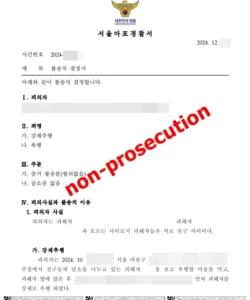When a foreigner acquires real estate in Korea, different laws and procedures apply depending on the purpose of the acquisition, whether the foreigner resides in Korea, and whether it is an individual or a corporation. If you are buying real estate for commercial purposes (such as renting out real estate) rather than simply for living in Korea, you will need to file a foreign investment report in addition to the real estate acquisition report.
In the case of non-resident foreigners, a real estate acquisition report in accordance with the Foreign Exchange Transactions Act must be filed with the relevant authorities in addition to the real estate acquisition report under the Act on Report on Real Estate Transactions.
The proceeds of a properly declared real estate sale can be freely taken out of the country, and Korea’s real estate-related taxes include acquisition tax, property tax, comprehensive real estate holding tax, transfer tax, and value-added tax.
However, Korea is not the easiest country for foreigners to buy and sell real estate in. In addition to the language barrier, some people take advantage of a foreigners’ lack of knowledge of the Korean real estate market. As a result, you may end up paying more for a property than it’s worth, or buying a property that’s not worth the investment, causing you to regret it later. Therefore, it is important to thoroughly conduct due diligence such as reviewing contracts and inspecting properties with the help of a Korean real estate lawyer in advance to prevent falling victim to unfair situations and scams.
In this article, we will provide guidance regarding the South Korean real estate purchase and registration process, and what you need to know as a foreigner or a foreign corporation looking to acquire real estate such as apartments and office spaces as well as land, shops, and buildings in Korea.
1. Laws Applicable to the Acquisition of Real Estate by Foreigners in Korea
Table of Contents
|
Category |
Act on Report on Real Estate Transactions |
Foreign Investment Promotion Act |
Foreign Exchange Transactions Act |
|
Applied to |
Foreign individuals, foreign corporations, domestic corporations with more than 50% ownership by foreigners, foreign governments, international economic cooperation organizations, etc. |
– Foreign individuals – Foreign corporations – Foreign permanent residents – Organization for International Economic Cooperation organizations, etc. |
– Non-residents |
|
Main Contents |
Real estate acquisition notification: When a foreigner acquires real estate in Korea
|
Notification of foreign investment: When a foreigner acquires real estate through a foreign-invested company |
Notification of real estate acquisition: When a non-resident acquires real estate-related rights (leasehold, mortgage, etc.) |
|
Reporting Authority |
City, county, or district office of where the land is located |
Foreign Exchange Bank, KOTRA Foreign Exchange Bank |
Foreign Exchange Bank |
|
When to report |
Within 60 days of contract signing |
Before transferring investment funds |
When withdrawing funds for real estate acquisition |
|
Responsible Ministry |
Ministry of Land, Infrastructure, and Transport |
Ministry of Trade, Industry and Energy |
Ministry of Strategy and Finance |
2. Real Estate Acquisition Procedures for Foreign Residents/Non-Residents and Foreign-Invested Companies
1) Resident Foreigners
– The Act on Report on Real Estate Transactions, etc. and the Registration of Real Estate Act apply to the acquisition of real estate by foreigners who are residents.
– Resident foreigner: refers to individual foreigners and domestic branches of foreign corporations.
(1) Real estate purchase contract and payment
– Finalize the real estate contract through a lawyer or real estate agent and complete the payment to the seller.
(2) Notification of real estate acquisition
– Notify the city, county, or district office where the property is located.
– Deadline for submission: Within 60 days from the date of concluding the contract or from the balance payment date.
– Required documents: Real estate contract, copy of real estate registration (seller’s name)
– Processing time: Immediately
(3) Real estate registration (transfer of ownership)
– You must register the transfer of real estate ownership at the land registry that has jurisdiction over the land.
– Registration application deadline: 60 days from the date of contract signing (balance payment)
– Documents to be submitted:
1. Alien registration card (individual) or copy of corporate register (corporation)
(* In the case of resident foreigners, the registration number and real estate registration address refer
to the corresponding resident alien registration number and address listed in the alien registration
card or corporate registration card)
2. Registration application form, proof of registration (contract, etc.), registration certificate, certified
copy of real estate registration
3. Power of Attorney and delegate’s ID card (if applicable)
– Processing time: Immediately
2) Non-resident Foreigners
– The Foreign Exchange Transactions Act, the Act on Report on Real Estate Transactions, and the Registration of Real Estate Act apply to the acquisition of real estate by non-resident foreigners. The procedures for real estate acquisition contracts, acquisition reports, and real estate registration are the same as for resident foreigners, but the procedure for applying for a real estate registration number is additionally required.
(1) Real estate purchase contract and payment
– When withdrawing funds for real estate acquisition, a real estate acquisition notification must be filed with the head office or branch of a foreign exchange bank in accordance with the Foreign Exchange Transactions Act.
– Required documents are the real estate acquisition contract, real estate appraisal report or publicly notified land price certificate, and certified copy of real estate registration. The acquisition of rights to real estate (real right, right to lease, etc.) should be notified, as well, while the notification of acquisition of rights is required for further overseas remittance of the gains on disposal of the real estate.
– Non-resident foreigners must prepare the following documents before entering Korea:
For individuals: a copy of their nationality certificate, a copy of their residence certificate, or a proof of address issued by their home government.
For corporations: A copy of the certificate of incorporation (with address) or an proof of address issued by their home government.
(2) Notification of real estate acquisition
– Notify the city, county, or district office where the property is located. The deadline is within 60 days from the date of contract conclusion, and the document to be submitted is the real estate acquisition contract.
(3) Application for registration number for real estate registration
– A registration number shall be assigned by the head of a local immigration office having jurisdiction over his/her place of residence (if he/she has no place of residence in Korea, the seat of the Supreme Court shall be deemed his/her place of residence).
– Required documents for individuals: certified copy of land acquisition report and copy of passport
– Required documents for legal entities: besides the documents for corporations, a certification of completion of land acquisition notification, corporate registration certificate, documents certifying the company’s representatives and their addresses issued by authorities in their home country
– Power of Attorney and delegate’s ID card (if applicable)
– Where to apply:
Individual: Immigration office
Corporations: City, county, or district office with jurisdiction over the location of the property
(4) Real estate registration (transfer of ownership)
– You must register the transfer of real estate ownership at the land registry that has jurisdiction over the land.
– Registration application deadline: 60 days from the date of contract signing (balance payment)
– Required documents include alien registration certificate (individual), branch corporation registration certificate (corporation), application form, documents certifying the reason for registration (approved contract, etc.), certificate of title, and real estate registration certificate.
– Power of Attorney and delegate’s ID card (if applicable)
3) Foreign-invested companies
– When a foreign-invested company acquires real estate for commercial activities, it must comply with the Act on Report on Real Estate Transactions, the Foreign Investment Promotion Act, and the Real Estate Registration Act
(1) Notification and registration of foreign-invested companies
– Reporting the foreign investment and registering at the head office or branch of a foreign exchange bank or KOTRA.
(2) Real estate purchase contract and payment
– Finalize the real estate contract through a lawyer or real estate agent and complete the payment to the seller.
(3) Notification of real estate acquisition
– Notify the city, county, or district office where the property is located. The deadline is within 60 days from the date of contract conclusion, and the document to be submitted is the real estate acquisition contract.
(4) Real estate registration (transfer of ownership)
– Register a transfer of ownership at the competent registry office within sixty days of the contract conclusion date or balance payment date.
– Required documents include alien registration certificate (individual), branch corporation registration certificate (corporation), application form, documents certifying the reason for registration (approved contract, etc.), certificate of title, and real estate registration certificate.
– Power of Attorney and delegate’s ID card (if applicable)
3. How a Real Estate Law Firm in Korea Can Help Foreigners Safely Acquire Real Estate
Foreigners who are not familiar with Korean language and culture are advised to seek the assistance of a real estate law firm in Korea.
This is because a real estate lawyer not only has the knowledge of Korean real estate laws and property market analysis but can also help you with all aspects of the process, including assisting you with finalizing various real estate transaction contracts, legal due diligence, a review of licenses and regulations, negotiating contract terms, establishing a company for the investment, foreign currency exchange processes, registrations, and more.
In addition, Korean lawyers equipped with excellent foreign language skills can handle various legal matters to ensure successful investment activities of foreign investors, and they can also provide legal services related to registration and licensing by utilizing the expertise of specialized personnel such as real estate brokers and real estate investors.
Foreigners can also use the services of law firms to secure ongoing management after the acquisition of real estate. Additionally, after investing in real estate in Korea, foreign investors can receive extended assistance in various other legal matters such as corporate law, labor law, antitrust law, contract law, intellectual property law, and tax law.
4. Q&A (Real Estate Law Firm Korea)
Q1. Can foreigners (including corporations) freely acquire real estate (including land) in Korea?
A1. Foreigners, regardless of whether they reside in Korea or not, may acquire real estate (including land) under the same conditions as Koreans, without restrictions on use, size, etc- Regulations governing the acquisition, use, and development of land are the same as those for domestic residents.
– Parties who intend to enter into a contract to transfer or establish ownership or superficies (including the right aimed at acquiring the ownership or superficies) in relation to land in an area subject to permission, must jointly obtain the permission from the head of the city, county, or district (Article 11 of the Act on Report on Real Estate Transactions, etc.).
– An exception where prior permission is required, is if a foreigner wishes to acquire land within military bases and installation protection zones, designated cultural heritage and their protection facilities and zones, ecological and scenery conservation areas, and special wildlife reserves (Article 9 of the Act on Report on Real Estate Transactions, etc.).
– In this case, if it is recognized that the acquisition of land such as a zone/area requiring prior permission does not interfere with fulfilling the designated purpose of that zone/area, the licensee must obtain a land use plan confirmation from the head of the city, county, or district to find out the main regulatory details of the land.
Q2. What are the obligations for foreigners when they buy real estate in South Korea?
A2. When a foreigner acquires real estate in Korea, it must be reported in accordance with the Act on Report on Real Estate Transactions, etc. The acquisition of real estate due to a contract (including a purchase and sales contract) must be reported within 60 days from the date of the contract to the city, county, or district office with jurisdiction over where the property is located.
If you acquire real estate due to causes other than a contract (such as through inheritance, auction, finalized court judgment, etc.), you must report it as well, but in this case, it needs to be done within six months.
Q3. Can a foreign corporation acquire land without establishing a separate corporation or branch in Korea?
A3. It is possible to acquire land for non-profit purposes without establishing a separate corporation or branch office in Korea, but in this case, the acquired land cannot be used for commercial activities such as leasing.
– If the acquisition is for the purpose of commercial activities (such as leasing, etc.), the establishment of a corporation or branch in Korea is required, in accordance with Article 614 of the Commercial Act.
– If a foreign corporation purchases real estate directly and then establishes a separate corporation for commercial activities such as leasing, it will be necessary to pay the acquisition tax and registration tax again due to the change in the name of the property, so it is recommended to establish a branch or corporation in Korea first, and then purchase the property in its name.
– Even if a domestic company enters into a sale and lease agreement with a foreign company, the foreign company must establish a corporation or branch in Korea, since leasing is considered a commercial activity
– A foreign corporation that does not have a domestic office can also register the purchased real estate, and in this case, the real estate registration number must be granted by the city, county, or district office with jurisdiction over where the land is located.
Q4. Do I need to file a real estate acquisition notification even if I have been sold an apartment or office building?
A4. Yes, you must file a real estate acquisition notification in the same way as the basic real estate acquisition procedure even if you have been sold an apartment, office building, residential complex, etc.
Q5. If a foreigner sells the property he or she has acquired, can the proceeds be freely transferred abroad, and what are the procedures?
A5. The sale proceeds of real estate purchased with acquisition funds that have been legitimately received through a bank account can be freely and fully remitted abroad.
Transfer of Real Estate Purchase Funds by Non-Resident Foreigners:
– The import of real estate acquisition funds must be reported to the head of a foreign exchange institution, and the proceeds from the sale of real estate purchased with the declared funds can also be exported by simply filing a report.
Transfer of Real Estate Purchase Funds by Resident Foreigners (at least 6 months)
– The funds for the purchase of real estate can be freely imported, but the sale proceeds of real estate purchased with domestic funds must be reported to the Governor of the Bank of Korea.
– In the case of rental income from real estate, it is possible to withdraw these funds by submitting documents proving the acquisition of the funds to a foreign exchange agency and obtaining the confirmation of the head of the foreign exchange agency (Article 4-4, Paragraph 1 of the Act on Foreign Exchange Transaction Regulations).
– The withdrawal of rental deposits received from renting property to residents must be reported to the Governor of the Bank of Korea (Article 2-3, Paragraph 1, Subparagraph 3 of the Act on Foreign Exchange Transaction Regulations).
Q6. What are the tax incentives for foreigners when acquiring land in Korea?
A6. Acquisition tax, registration tax, and property tax are reduced in the case of acquisition of land for industrial support service businesses and projects involving advanced technology that are vital to strengthening the national competitiveness under the Foreign Investment Promotion Act as well as in the case of land acquisition in foreign investment zones. (The period and rate of reduction within a period of 15 years is determined by local government regulations). Companies registered as foreign-invested enterprises under the Foreign Investment Promotion Act are exempted from purchasing national housing bonds when registering business real estate.
Q7. What is the real estate brokerage fee for foreigners purchasing real estate in Korea?
A7. Real estate brokerage fees are set by city and provincial regulations within the scope of the Enforcement Decree of the Licensed Real Estate Agents Act for residential properties, and by the Enforcement Decree of the Licensed Real Estate Agents Act for non-residential properties.
Therefore, the commission rate may vary depending on the location of the real estate, so it is recommended to check the relevant laws and regulations to ensure that the fee you are paying is within the specified range.




